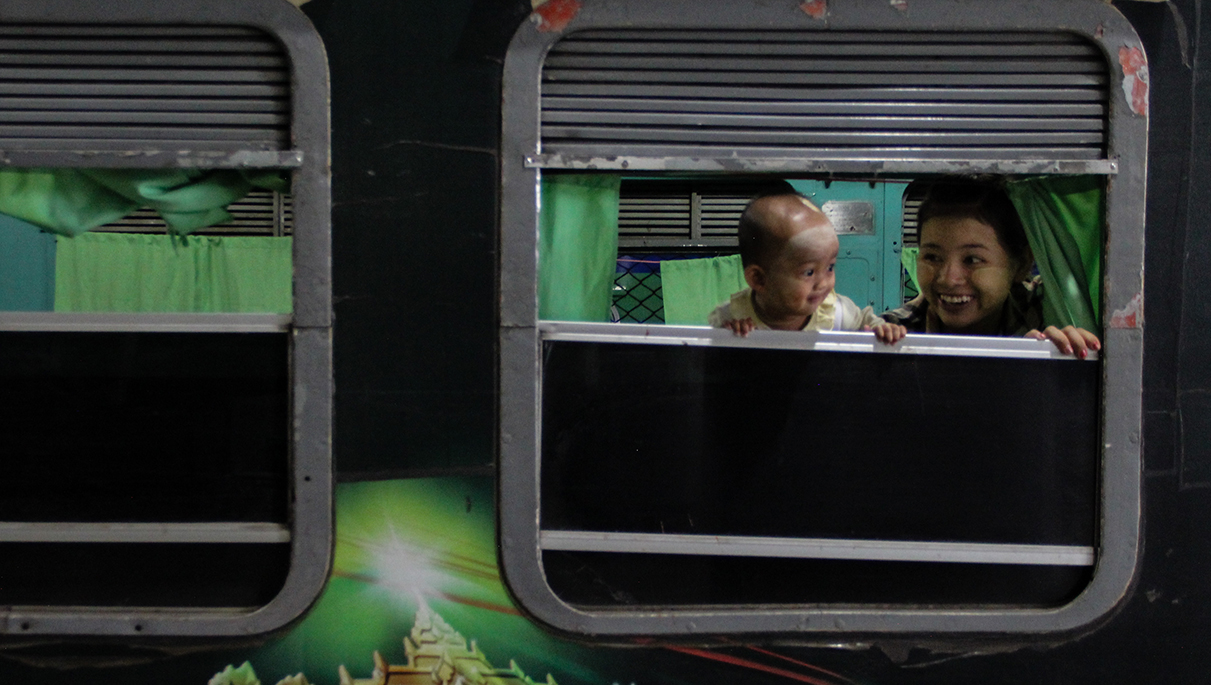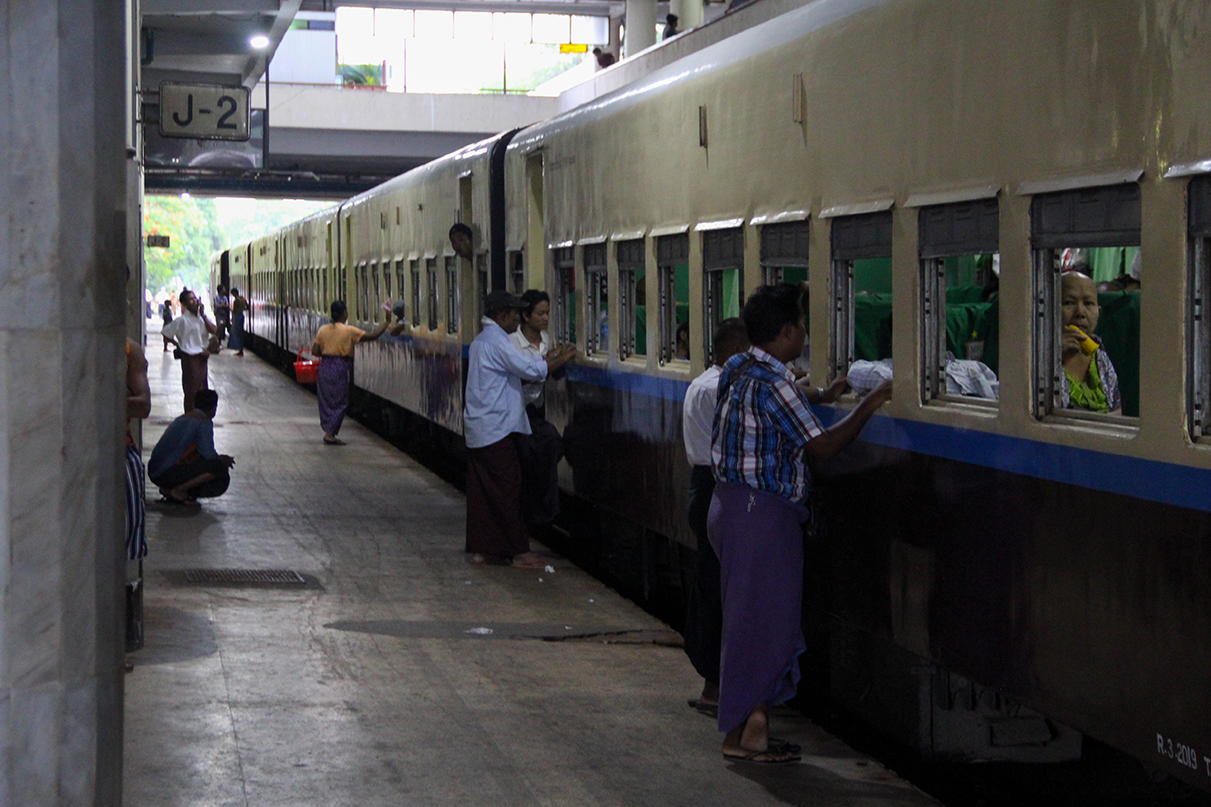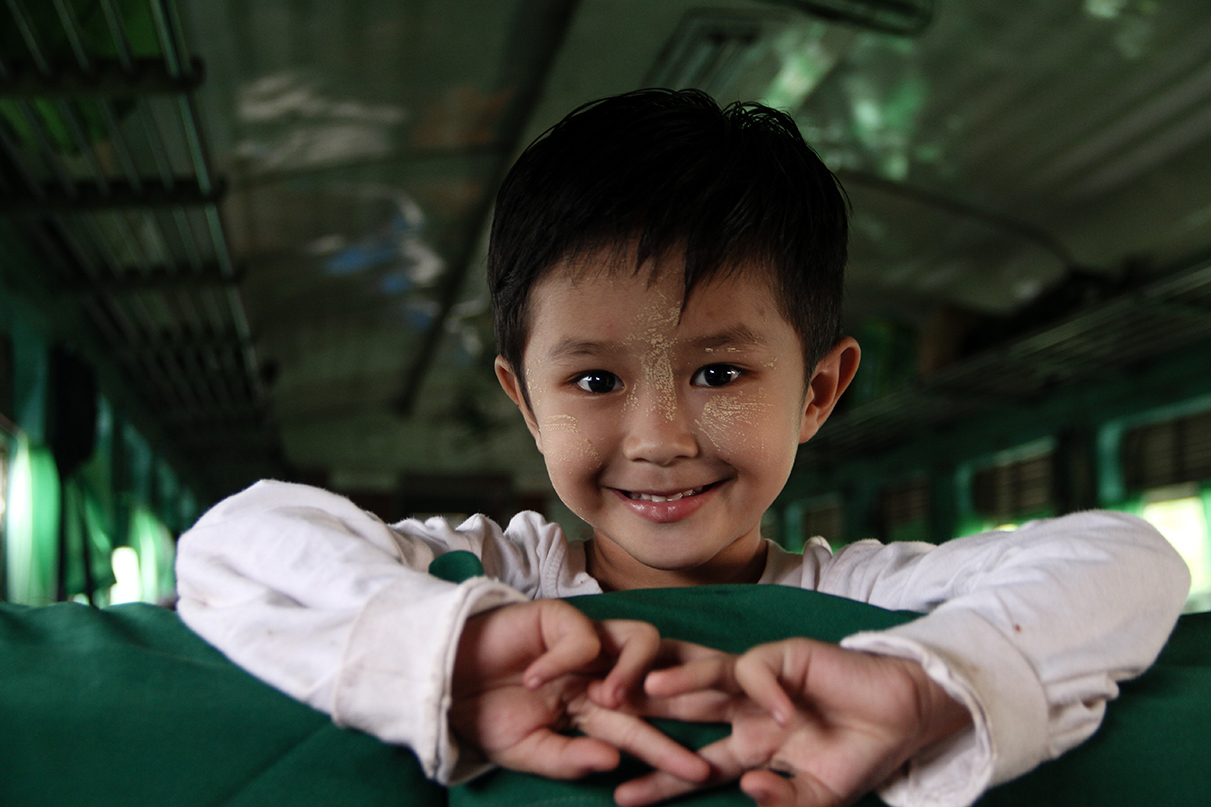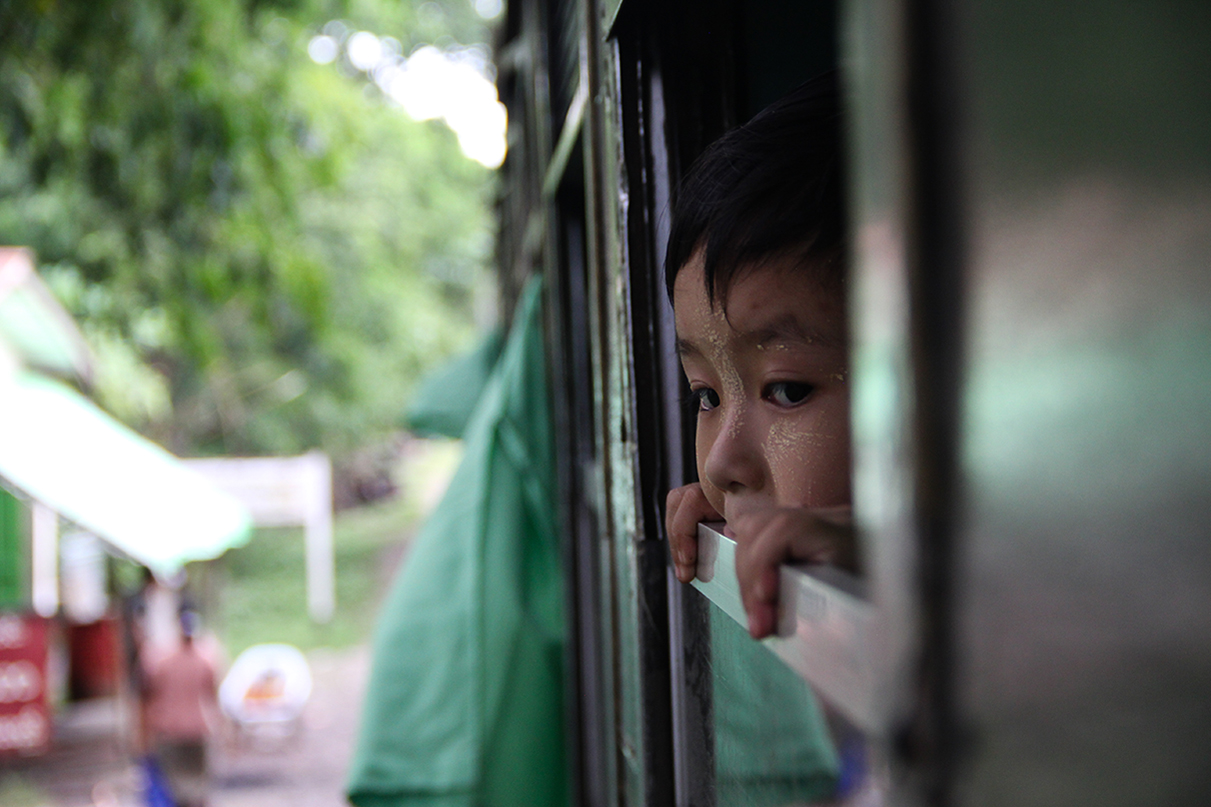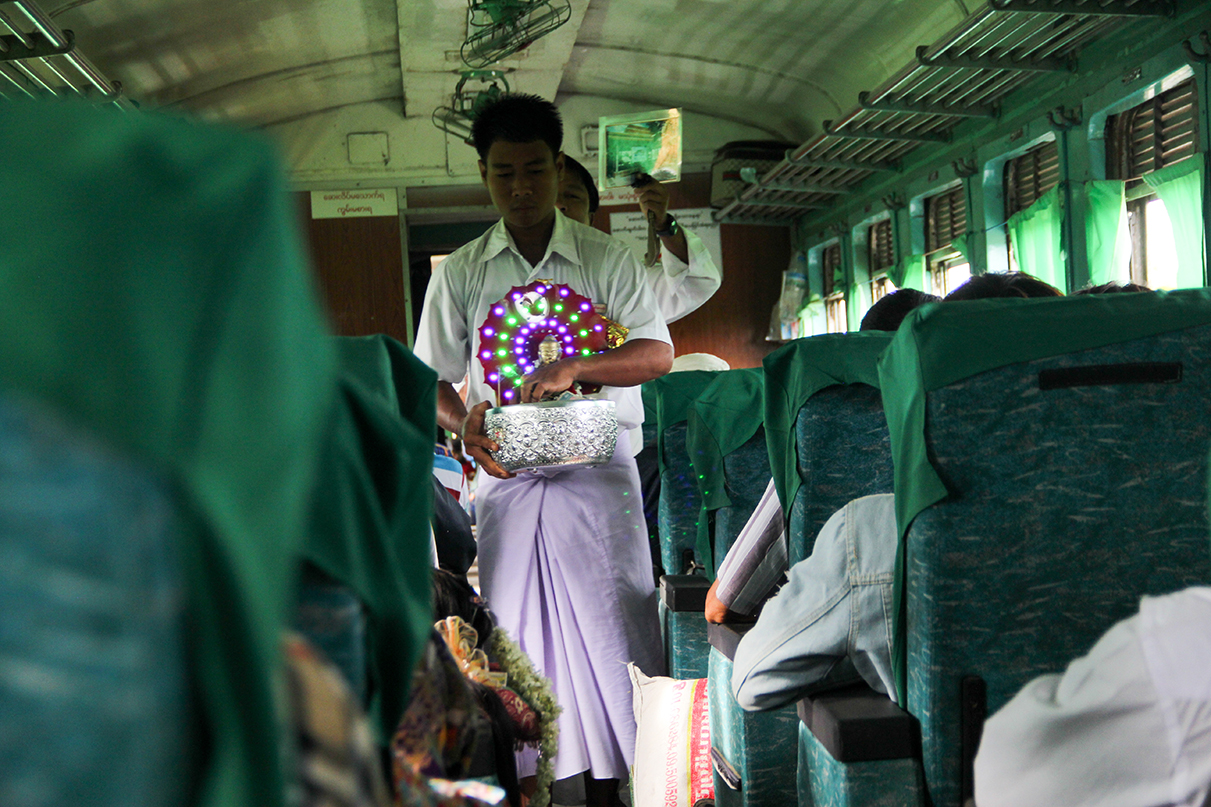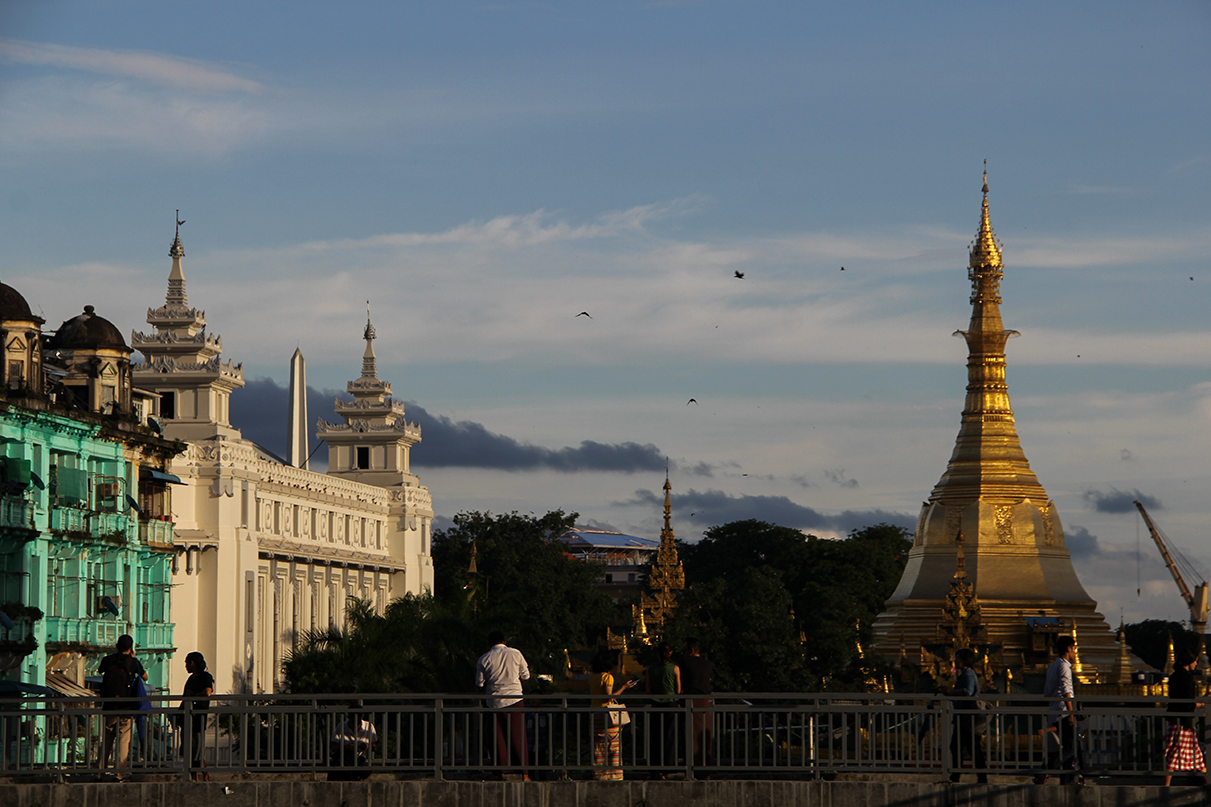The Train to Yangon
July 19, 2017
The Green Lion
My alarm goes at 4.30AM, but I’m already awake. I’m leaving the monastery school after 3,5 weeks and I’m absolutely dreading my departure. It feels like I’m moving out of my home. At this time in the morning, the taxi shows me another side of Mandalay. Dozens of people are speed-walking along the riverbank next to the Royal Palace, with the sunset in the back. Their traditional clothing is briefly switched for a white shirt and a pair of shorts. Myanmar is still a highly traditional country and in all my time here, I’ve never seen so many knees. A bit further, a few dozen novice monks color the street red with their robes, while they stand in line with their food bowl for a hotel to give them fresh fruit as a donation. I’m face slapping myself that I didn’t spend more mornings staring at the scene. Mandalay is a different world at this hour.
At the train station, we’re off to a good start. They’re trying to get a dog out that hopped on the wagon, much to no avail. He’s cute, so I wouldn’t mind if he can be my entertainment for the next fifteen hours. Because yes, that’s how long this train ride is going to take. Please read back to the previous sentences, acknowledge the number of hours, and pity me. I’m travelling 575 kilometers from Mandalay to Yangon and this trip isn’t about getting there fast. An air conditioned VIP touring bus could take me there in half the time, but what’s the fun in that? I didn’t come to Myanmar to be stuck in a small space with other tourists, staring at a highway.
I splurged by spending a total of €6,26 on an Upper-Class seat, instead of a typical wooden bench. Living large! This buys me a big fluffy seat that can even recline, with a surprise bottle of water. I’m lucky and my chair isn’t in a typical need of repair. The train itself is spacious and half-full and the chair next to me stays empty the entire ride. So far so good.
I think about the nice naps that I’ll be having, which is needed after a month of enthusiastic exploring, but then the train starts driving. This thing is bumpy beyond words. For fifteen hours, the shaking is non-stop and extreme, like sitting on a horse. I can’t sleep on a horse. You get used to it soon enough, but five hours in my shoulders begin to cramp. It’s what you get for sitting on a massage chair the entire time. Then I look outside to the many farmers bend over working a rice field with their bare hands, and I know I have no right to complain about back pains.
The other passengers on this wagon are a bit of a mixed crowd. A lady throws a big plastic bag of trash out the window without blinking, into a rice field. An old man rests his feet high in the window to take a nap. Later, a conductor slaps his legs down to the ground. Pointing your feet is considered incredibly rude in most Buddhist countries and he ought to know better. My neighbors buy a bag of green leaves which they start chewing on. Inside is betel nut, staining their teeth and lips red. Let’s call it fashion. The betel nut can be compared with a cup of coffee: it will keep you from going hungry and makes you stay awake longer. It’s highly popular in Myanmar (in particular with lorry drivers). The red gunk that remains is spat out at any random moment, making the streets of Myanmar one big sticky artwork you don’t want to step on. Luckily my neighbors have the courtesy to spit into a plastic bag next to me every few minutes.
My favorite fellow passenger is the baby one seat over. She’s a ball of constant joy with a round face, plastered with Tanaka; the traditional paste made by tree bark that Burmese use as sunscreen and fashion statement. Her mother changes her diaper on the seat. Moments later, mom dips a soft cloth into her mouth until it’s wet and uses it to wash her baby’s face with much affection. A few villages further, another cutie walks in whose hobbies include staring at me, mumbling to me in Burmese and putting other’s second hand spoons in her mouth. She quickly becomes my new train-bestie and her mother enjoys taking picture of us together. I guess I’ll be up on someone’s Facebook tonight.
In between glancing at passengers, there’s quite a remarkable scenery outside too. As soon as you leave the big city, all you see are houses made of bamboo or rusty metal plates. In between mountains are thousands of farmers working their bright green fields. They use either their bare hands, or a cart with oxen. Even the male farmers still rock the longyi look (a traditional ‘skirt’) while ankle deep in water. As we continue, at any random spot a golden pagoda pops up. In a small village we pass, the main form of transportation seems to be horse drawn carriages.
The biggest entertainment comes from the vendors selling produce from the top of their head. There’s one coming by literally about every two minutes. It’s almost as if there are more vendors than passengers, and it’s a mystery how they can all make their living. Most walk in screaming their produce and making sure any nap is nicely interrupted. They sell anything, from smelly durian to quail eggs, from wet wipes to ice-cold drinks. A few vendors gather around my seat as soon as I pull out my laptop. They simply stare at my fingers and smile while I type my stories. Mingalaba, nice to meet you too. Another passenger tried to take a selfie with me when he thinks I’m not looking and I realize I’ve created a small spectacle.
As the hipsters like to say: travel is about the journey, not the destination. Just do it: grab that train across the country. Observe how the real Burmese do things in life and join them. Do what your mother told you not to do, and talk to strangers. Your grandchildren won’t be interested to hear about “that plane ride you once took”. Complain about the seat, the bumps, or your back, but still love the remarkable ride in this astonishing country. All you have to lose is a day in your life and about €6,26.
